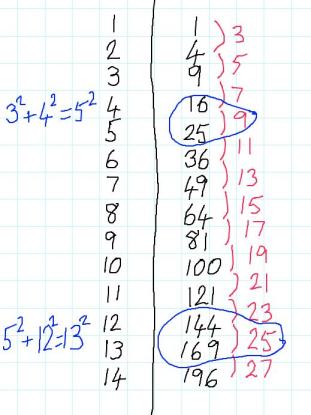
If the sides of a right angled triangle are $a$, $b$ and $c$ units, with $c$ being the hypotenuse or longest side, we know by Pythagoras' Theorem that $a^2+b^2=c^2$.
Charlie has been looking for examples where $a$, $b$ and $c$ are all whole numbers. These sets are called Pythagorean Triples.
He drew a table:

From his table, he spotted two sets of Pythagorean triples:
$3^2+4^2=5^2$
$5^2+12^2=13^2$
Can you find more Pythagorean Triples like Charlie's?
Can you find a formula to generate them?
Can you prove that your formula works?
Alison has been working on Pythagorean Triples where the hypotenuse is 2 units longer than one of the other sides.
So far, she has found these:
$4^2 + 3^2 = 5^2$
$6^2+8^2=10^2$
$8^2+15^2=17^2$
Some of these are just scaled-up versions of Charlie's triples, but some of them are new and can't be divided by a common factor (these are called primitive triples).
Can you find more Pythagorean Triples like Alison's?
Can you find a formula for generating Pythagorean Triples like Alison's?
Can you prove that your formula works?
Here are some other questions you might like to consider:
- Can you find triples where the hypotenuse is 3 units longer than one of the other sides? Or 4 units longer? Or...?
- Can you say anything about when such triples will be primitive triples?
- Are there any triples where the two shorter sides differ by one unit?
Share your thoughts and discoveries
Comments
square numbers
I noticed that if $a^2 + b^2 = (b+2)^2$, a and b have nothing in common but the hypotenuse is always two more than one of the other sides.
Which simplified gives us ... a = 2 times the square root of b+1.
To find b you just need to take away 1 from a square number, and to get the value of a you input b into the formula above.
- Log in to post comments
